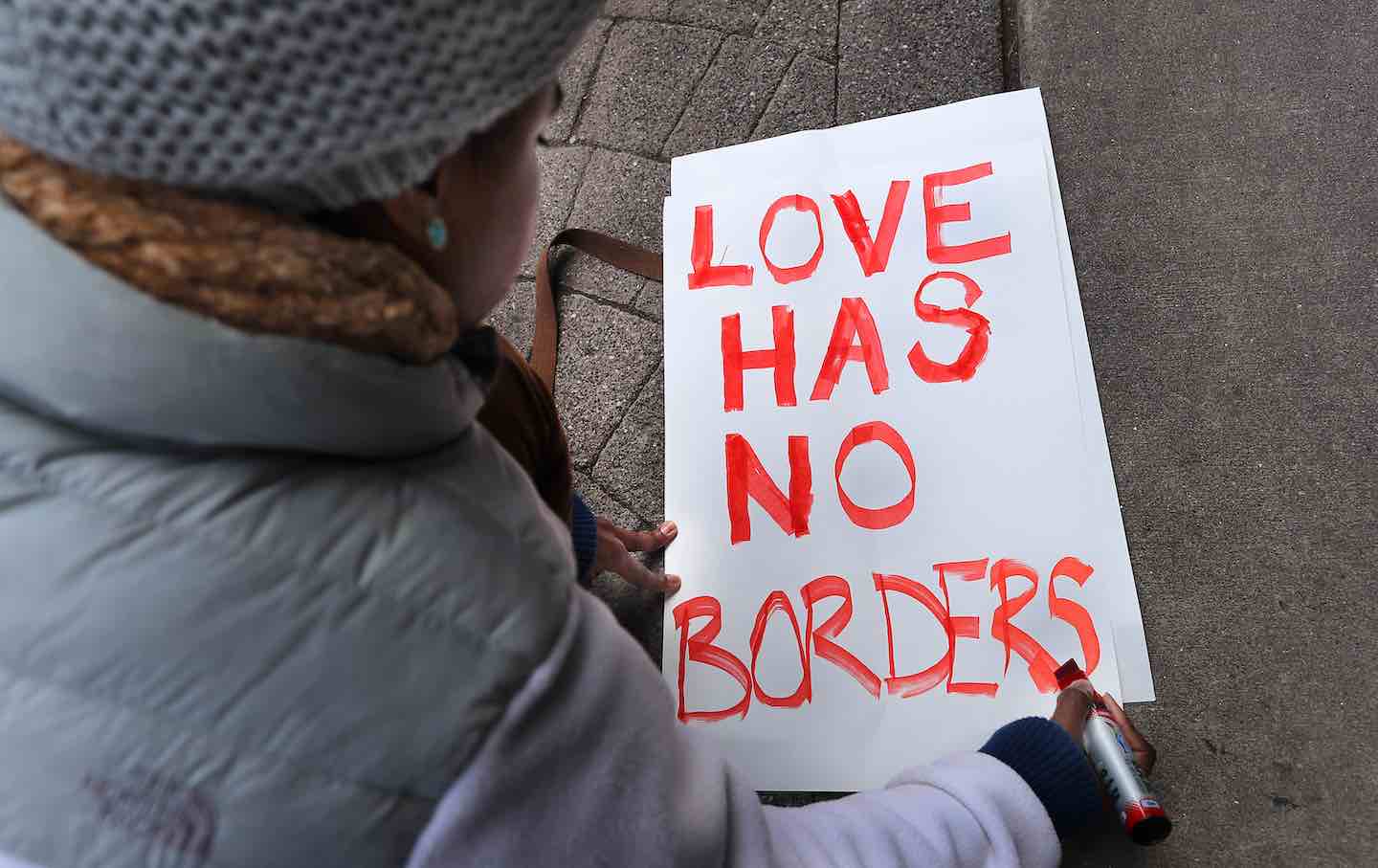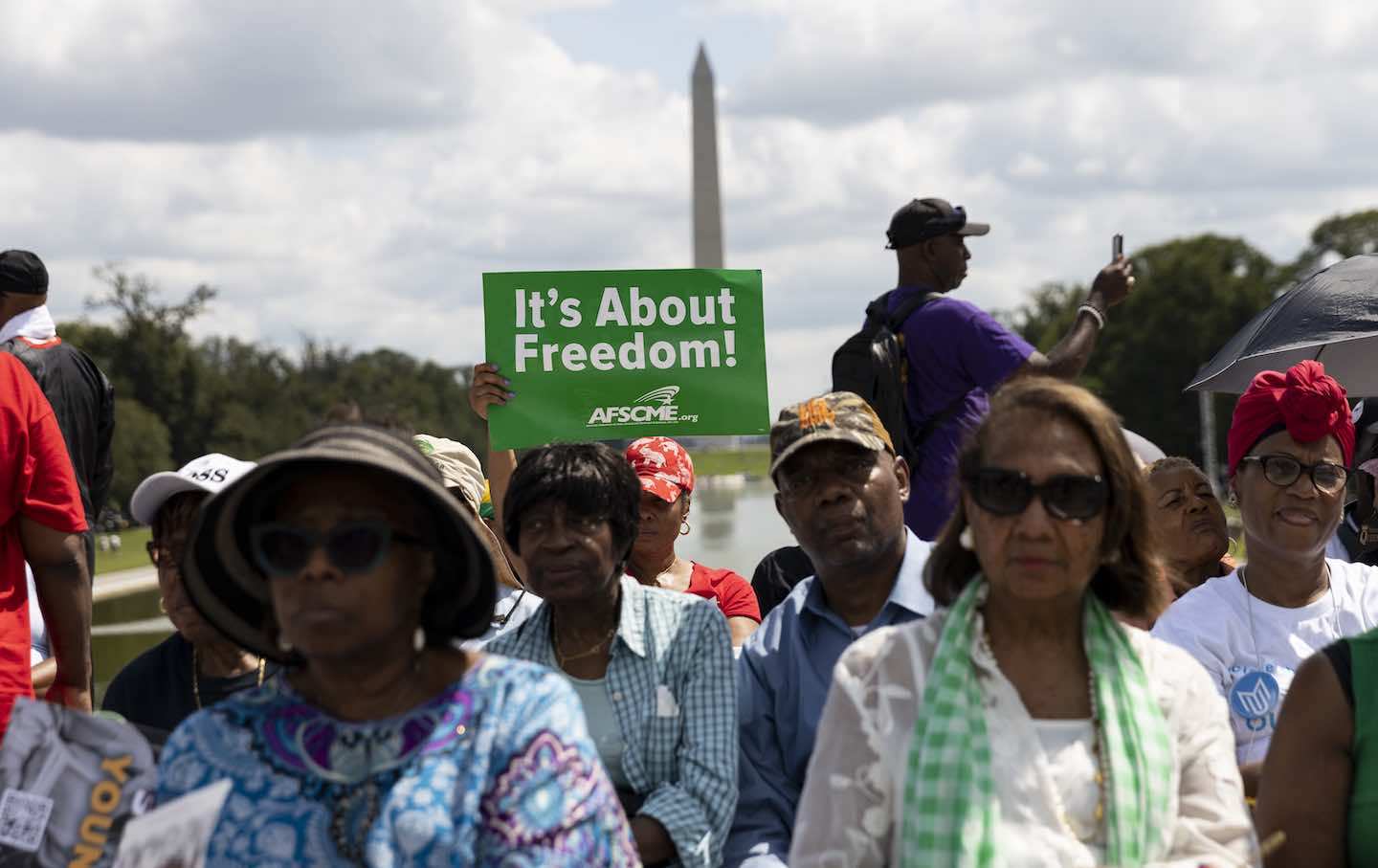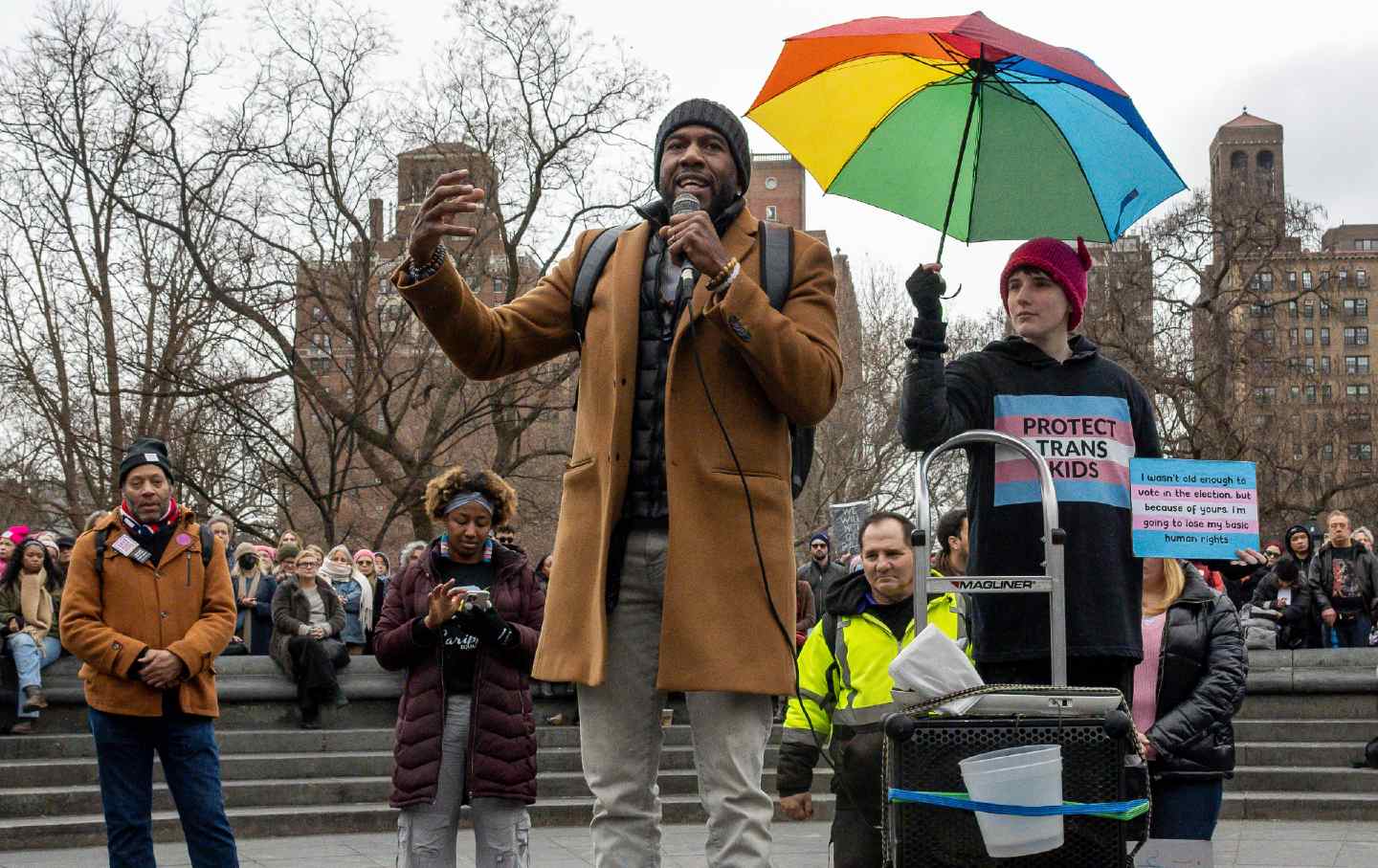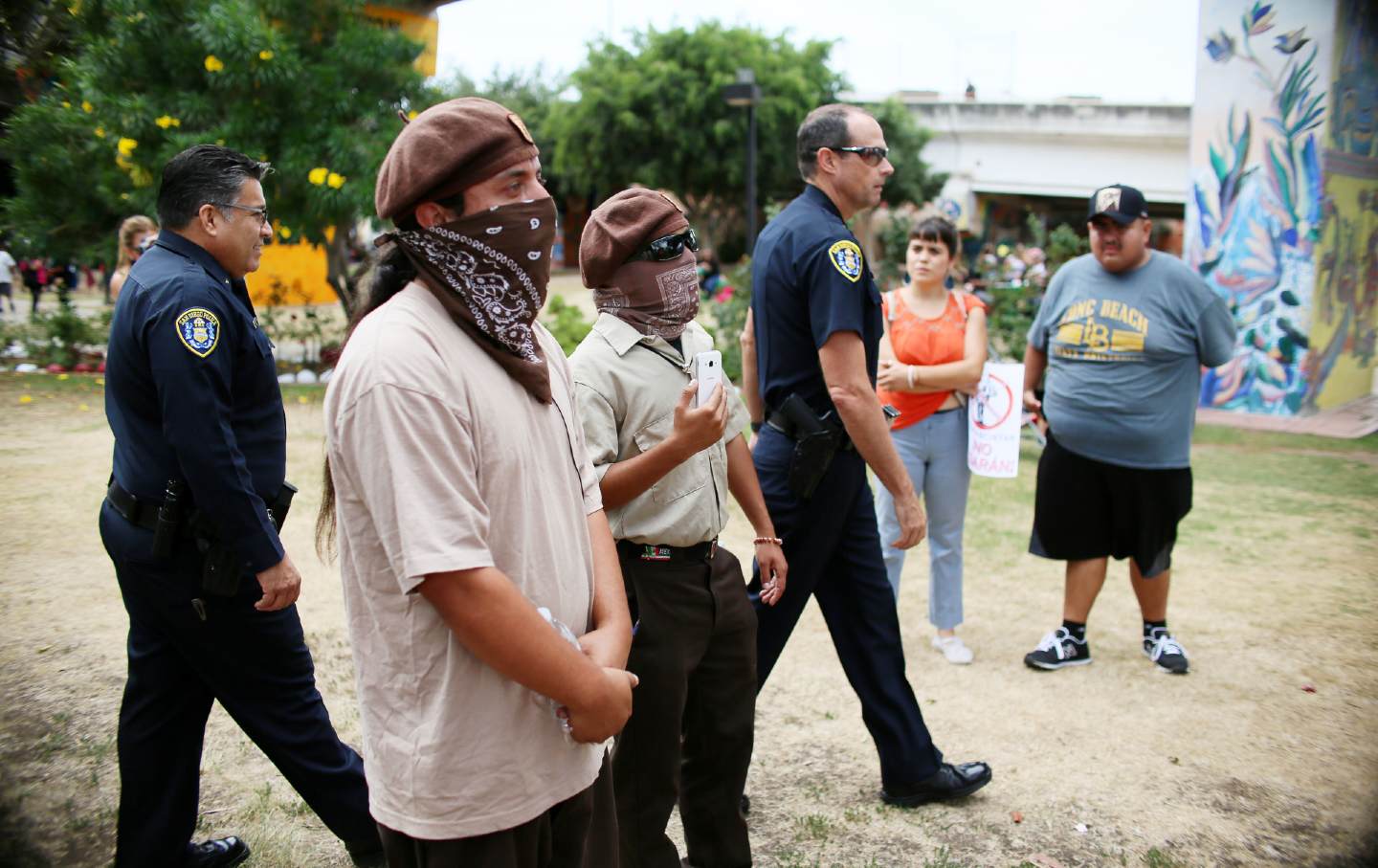Think There’s Nothing You Can Do to Stop ICE? Think Again.
Chicago’s years of organizing against immigration raids are a blueprint for real resistance to Trump’s attacks—as even his top goons acknowledge.

Trump “border czar” Tom Homan on CNN on January 27, 2025.
(CNN)During an interview on CNN last week, Tom Homan, Donald Trump’s so-called “border czar,” made a big admission. Apparently, the residents of Chicago are making it too damn hard for ICE to enact Trump’s mass deportation plan. “Chicago, very well educated,” Homan whined. “They’ve been educated how to defy ICE, on how to hide from ICE. They call it ‘Know Your Rights.’ I call it how to escape from ICE.”
Homan’s comments do more than unintentionally boost my city’s local pride. They also implicitly acknowledge both the power of collective resistance and the fact that one of the most potent weapons we have in our campaign against Trump’s deportation campaign is a basic knowledge of our fundamental rights. Chicago is providing evidence in real time that when communities band together, we can defy and frustrate even the most aggressive Trump policies and the armed minions sent to enact them—all without so much as throwing a single punch. In many instances, all it takes is simply refusing to open a door.
This is especially true for people in industries like hospitality, where undocumented workers are disproportionately employed in cities across the United States. As the executive director of a group that organizes Chicago’s hospitality workers, I know that our restaurants, bars, and hotels rely on the labor, culture, creativity, and resilience of immigrants, many of whom are undocumented. For them and their families, Trump and Homan’s bluster has evoked a familiar dread—a return to the family separations, workplace raids, and neighborhood crackdowns that defined Trump’s first term and, before that, the Obama years during which Homan was first appointed and honored with a Presidential Rank Award by President Obama.
Targeting these members of our communities is neither new nor unique to Trump, with even Democrats like Senator Chris Murphy gloating that Joe Biden was better at mass deportations than Trump has been so far, but history offers powerful lessons in how workers can organize to protect one another and resist state violence.
Organized resistance to immigration enforcement in the United States has deep roots, from the Underground Railroad to the present. Our current movements to subvert inhumane, racist immigration laws are directly tied to the 1980s, when US-backed violence and economic deprivation in Central America displaced millions of people. The Reagan administration denied asylum to the overwhelming majority of refugees. In response, churches, workers, and grassroots activists built the modern sanctuary movement, providing shelter and support to those fleeing violence. This underground network shielded thousands and reshaped public debate, challenging the US government’s role in fomenting the violence driving migration and the responsibility to shelter refugees that US foreign policy had, in part, created.
Hospitality workers have long played a vital role in sanctuary movements. Bars, restaurants, and hotels have been crucial spaces for organizing and mutual aid, and many hospitality workers have collaborated discreetly with advocacy groups to connect undocumented colleagues and their families with legal and financial aid while shielding them from detection.
The hospitality industry is fundamentally about creating spaces where people feel safe and valued. This ethos extends beyond customers to include our coworkers. Mutual aid, a practice rooted in solidarity and collective support, is how we uphold this ethos when systemic failures expose our most vulnerable colleagues to harm. When the state targets immigrant workers, it is not just an attack on individuals; it is an assault on the core principles of what it means to be hospitable.
At the same time, the hospitality industry has long relied upon the exploitation of these same individuals. Low wages and wage theft, unsafe working conditions, and rampant harassment are common in the industry. Undocumented workers, in particular, are vulnerable to this abuse, with their immigration status often weaponized—either implicitly or explicitly—by owners and managers to silence complaints or deny basic rights. It is in this context that worker solidarity is crucial. We must demand that our industry begin paying its enormous debt to our most exploited and vulnerable coworkers, emphasizing that building solidarity against everyday workplace abuse and against state violence are one and the same task.
Solidarity cannot be simply rhetorical; it must be action-based and grounded in strategic preparation that builds on lessons from the past. During the Obama administration, for example, when deportations reached historic highs and earned Barack Obama the title of “deporter in chief,” rapid-response networks emerged in cities across the country. Volunteers stationed themselves outside courthouses and workplaces to monitor ICE activity, while encrypted messaging apps and text alerts helped families evade arrest.
Hospitality workers proved to be critical actors, often offering refuge and support to undocumented colleagues. In Chicago, where thousands of undocumented workers are employed in the hospitality sector, many bars and restaurants quietly ensured that their undocumented employees could rely on their workplaces as spaces of safety.
This was again evident during the nationwide ICE raids initiated under Trump in the summer of 2019. Activists in cities like Chicago, Los Angeles, and New York mobilized quickly. Know-your-rights workshops empowered people to utilize legal protections, while neighborhood groups distributed information door to door. On the days of the raids, coordinated efforts kept many communities on high alert, and mutual aid funds helped families weather the economic fallout of detentions. Hospitality workers were often key participants in these efforts, providing safe spaces in kitchens, basements, and backrooms while alerting community networks to ICE activity. Although enormous harm was still perpetrated, these actions significantly blunted the raids’ intended impact.
The same is happening again today, as progressive owners, managers, and workers have quickly organized themselves—something I know from the requests my organization has received for support, the firsthand accounts of workers, and the wide distribution of know-your-rights materials.
What unites these efforts is an ethos of collective care and solidarity. Even against the immense power of federal agencies, communities have shown they can build protective networks that shield the vulnerable and disrupt state violence. This is not to minimize the very real harm inflicted by deportations but to highlight how grassroots movements have played a key part in restraining the state’s ability to enact unchecked cruelty.
As the country braces for the ongoing threat of ICE raids and mass arrests, these histories offer a road map—and a reminder that it’s we all have the power to try to stop these attacks. We’re not helpless. We know what works.
Preparation is key. Resistance begins long before ICE agents arrive. Legal organizations and advocacy groups must aggressively promote know-your-rights education opportunities and ensure that cost-free resources are accessible in multiple languages. Communities can organize defense teams to monitor ICE activity and provide immediate support. Churches, libraries, and other trusted spaces can reaffirm their roles as sanctuaries, both symbolically and materially. Hospitality industry workers can ensure that our workplaces provide spaces of safety and solidarity for undocumented colleagues by collectively reviewing strategies for response if and when ICE shows up.
If ICE shows up at your restaurant, bar, or hotel, there are critical steps workers can take to protect ourselves and our colleagues. First, remain calm and avoid volunteering any information. Notify all staff immediately, prioritizing clear and calm communication, and avoid creating panic. Utilize encrypted messaging apps or other secure methods to alert community defense networks. Document the encounter by noting agents’ names, badge numbers, and actions, but do not physically interfere.
Workers have the right to remain silent and should not answer questions about their immigration status or provide information about others. Neither you nor business owners or managers should hand over identification or any papers to ICE, nor should you give them any false documents or information. You can instead simply state, “I am exercising my right to remain silent,” and decline to answer any questions, or you can request to speak to a lawyer and say no more.
Immigration agents may enter private areas of a workplace only with a judicial warrant signed by a judge, not just an administrative warrant (despite the fact that ICE agents will claim otherwise). If they attempt to enter, ask to see the warrant and verify its details, ensuring that it is properly signed with “US District Court” or that a state court is named at the top of the document and specifies the areas ICE seeks to access. If agents lack a valid warrant, you have the right to deny them entry to nonpublic areas. Ensure that know-your-rights materials are readily available to distribute to any targeted workers. Lastly, coordinate with local advocacy and mutual aid organizations to provide legal, financial, and emotional support in the aftermath of enforcement actions.
Mutual aid is indispensable to this whole process. I have seen firsthand how mutual aid transforms fear into action. During the Covid-19 pandemic, when my coworkers and I founded The CHAAD Project to organize Chicago’s hospitality workers, mutual aid networks flourished. As workers were abandoned en masse by our employers, we joined together to share critical information on labor violations, unemployment assistance, and other essential resources, prioritizing those among us in greatest need and those later excluded from government relief, including undocumented people.
We must build on these experiences and networks now, mobilizing as a community to provide bail funds, legal support, and material aid to families affected by deportations. Solidarity from outside the hospitality industry and immigrant community is equally crucial. Diverse labor unions have long stood with undocumented workers. In 2006, for example, when ICE raided meatpacking plants in the Midwest, unionized workers staged walkouts, demonstrating the power of collective action. Such support matters just as much now.
Public visibility is another vital tool. During the first Trump administration, viral videos of ICE raids and family separations sparked widespread outrage and forced policymakers to confront the human cost of enforcement. As arrests resume, documenting and publicizing these actions can again galvanize resistance.
Collective efforts to stop arrests and deportation of our immigrant neighbors do more than protect targeted individuals. They build enduring community power and give neighbors and coworkers reason to have confidence in one another. Every neighborhood defense team and mutual aid network strengthens the fabric of solidarity, fostering cultures of care that extend beyond moments of crisis. By circumventing deportations, communities weaken the broader politics of fear and division that fuel these policies.
Chicagoans are refusing to simply submit to cruel policies and obey oppressive federal authorities—and as Homan’s complaining shows, our tactics are working. But if we fail to condemn, resist, and subvert state violence, or become complacent and resigned over time, we will fuel the intensification and expansion of state violence against immigrants and, increasingly, anyone who falls afoul of police and authoritarian power.
Popular
“swipe left below to view more authors”Swipe →The Trump administration’s renewed deportation plans are a grave threat, but they are neither unprecedented nor insurmountable. Our own history as workers reminds us that collective action can disrupt such plans and turn campaigns of hate into engines for solidarity, care, and community.
The hospitality industry thrives on connection and care; these values guide our resistance. When we stand together—whether by turning restaurants into sanctuaries or organizing mutual aid networks—we redefine what it means to be hospitable. Our power as workers lies not just in the meals we serve or the rooms we prepare but in the communities we create and defend. By resisting the targeting of our coworkers, we both protect one another and move closer to building truly hospitable workplaces free of abuse and exploitation.
More from The Nation

Choosing Love Is How We Win Choosing Love Is How We Win
Now is the time to ask your community what they need—to connect and build power wherever you can.

Keep Going: Our Mission Has Not Changed Keep Going: Our Mission Has Not Changed
We owe it to our forebears, our families, our communities, and future generations to keep fighting for just causes, writes Nina Turner. We, too, shall overcome.

It’s Time to Stand Up Against Trump 2.0 It’s Time to Stand Up Against Trump 2.0
Most Americans voted for someone else in 2024, but as New York City’s public advocate said, “We’re going to have to stand together to get through this.”

Free Ismail Lghazaoui! Free Ismail Lghazaoui!
Morocco sentenced the Palestine solidarity activist to prison just for protesting. But the trail of his persecution runs from Israel across the Atlantic to New Jersey and Texas.

Cecile Richards Saved the Day for Us Cecile Richards Saved the Day for Us
The crusader for women’s and workers’ rights died Monday after a cruel illness. She inspires us to do the work ahead.

The CIA Illegally Spied on Puerto Rican and Mexican American Activists for Decades The CIA Illegally Spied on Puerto Rican and Mexican American Activists for Decades
And is probably still at it. As newly released classified documents confirm activists’ long-held suspicions, the disclosures should also alert us to current dangers.


